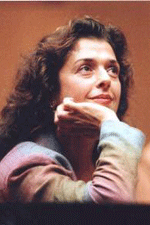> [Archived] Interviews

Interview with pianist Elena Bashkirova
Mrs. Elena Bashkirova you have the talent to impress through the warmth and naturalness of your performance. Although you are invited to perform with the most famous orchestras in the world, the music you prefer is chamber music. Give me some details about the alchemy you feel when you perform this type of music?
The attraction for chamber music is due to the happiness to cover a rich repertoire, with innumerable treasures, from classicism and romanticism to our days. I find the fact that I can play in different musical formulas illustrative, because I have many collaborators. They are great musicians and I have a lot to learn from them, because each of them opens new perspectives which is exciting. This time I am happy to be with some of my old friends, with whom I have been on tour before, Pascal Moragues, Mihaela Martin, Frans Helmerson and Ori Kam.
In 1998 you founded the International Chamber Music Festival in Jerusalem. What made you begin such a project?
It is a very important project for the inhabitants there. The festival is not based on an unusual idea, but it takes place in a special location. As a format, I envision programmes as varied as possible, with different themes from one edition to another. In the fourteen years since the festival exists, we have succeeded in gaining a special audience with whom we communicate very well. It is the most important musical achievement which I live in this difficult city.
What qualities do you appreciate in a musician?
Seriousness, enthusiasm, discipline - in fact it requires a lot of discipline, but also the curiosity for new - never stop assimilating.
Many world festivals concentrate on a certain theme. What idea did you choose for the International Chamber Music Festival in Jerusalem this year- which takes place between the 3rd -16th of September?
For this year's edition, I had three ideas in mind. The first is the celebration of Mahler, like everywhere in the world; we included covers for the chamber formulas, having as guests many good singers. The second idea is a tribute to Liszt, having not only works from his pianist literature, but also lieder or other arrangements. The third and the most important idea which guided me focused on the Holocaust, through composers who are connected with this tragedy: Viktor Ullmann, Erwin Schulhoff, Hans Krasa, Pavel Haas, Gideon Klein. Every recital has a work of theirs.
This edition of the festival in Bucharest associates Enescu's music with the music of his contemporaries. At the recital on September 23rd , you will perform works by Enescu and Bartok, a choice which could not be happier. Do you appreciate Enescu's music?
It is an amazing music and I am very happy to perform Piano Quartet No. 2 in D minor, Op. 30.It is an extremely complex opus, with rich, fascinating and beautiful harmony, which faces us with a great intellectual challenge. The language of this creator, little known, is unique! So, I am very honoured and I want to perform as well as I can this score which is known in Romania. We handle it with respect and I hope you will like it.
I would like to point out the fact that our interview was taken on 31st of August and for the next thirty days you are ready to play works by Schubert, Liszt,Beethoven, Musorgski, Schumann, Brahms and, of course, Enescu. Did I miss anyone?
I am sure you listed enough.
Is it hard to have such an intense activity?
It is difficult, nothing is easy. I am part of many interesting activities which no one forces me to do. I bring them about myself. Sometimes I am very tired, but at the end I am very satisfied.
Mrs. Elena Bashkirova, I would like to ask you about the dynamics in the relationship with your father and mentor, Dmitri Bashkirov. I think it is very exciting and wonderful to be raised by such a parent, with a strong artistic personality. When did you feel you were getting away from his tutelage?
He did not have a dominant personality, so to speak. He never constrained me to do anything, everything happened very normally. It was normal to start studying with him, I was very happy, he showed me the ways I had to go, and after that he stopped. Of course, he hallmarked my development; especially at the beginning, when he laid the foundation of my developing.
How do you feel when you perform together with your son, violinist Michael Bareboim?
I feel very well and it gives me great pleasure. When we are together on the stage, I forget he is my son. I see him as a colleague and I respect him. Then the family relationship disappears.
Translated by Elena Enache and Alexandra Ilie
MTTLC, Bucharest University














